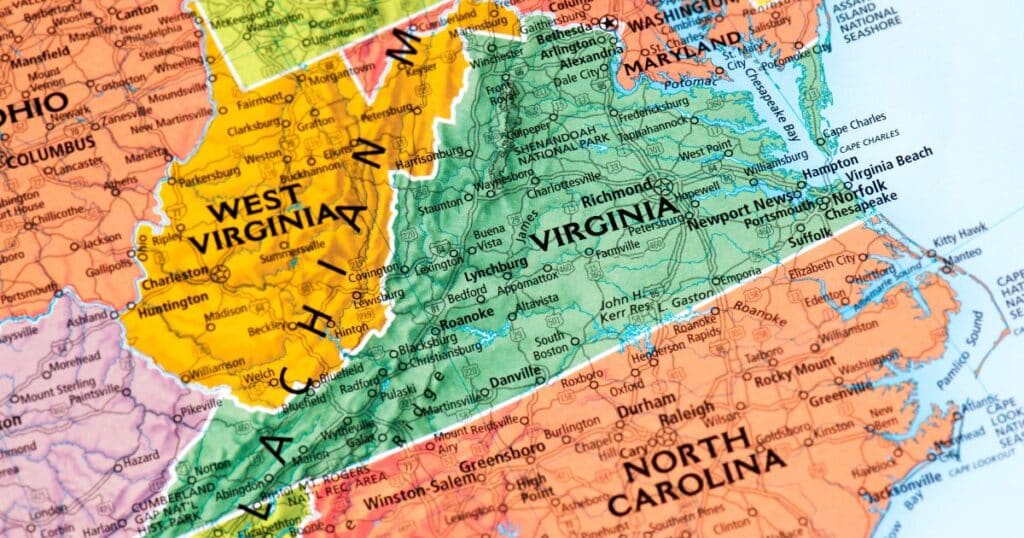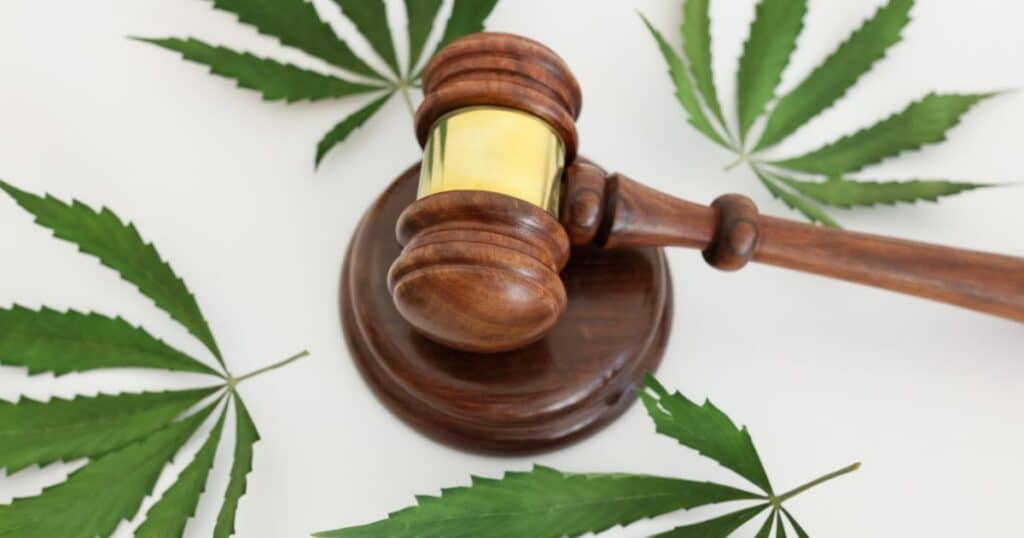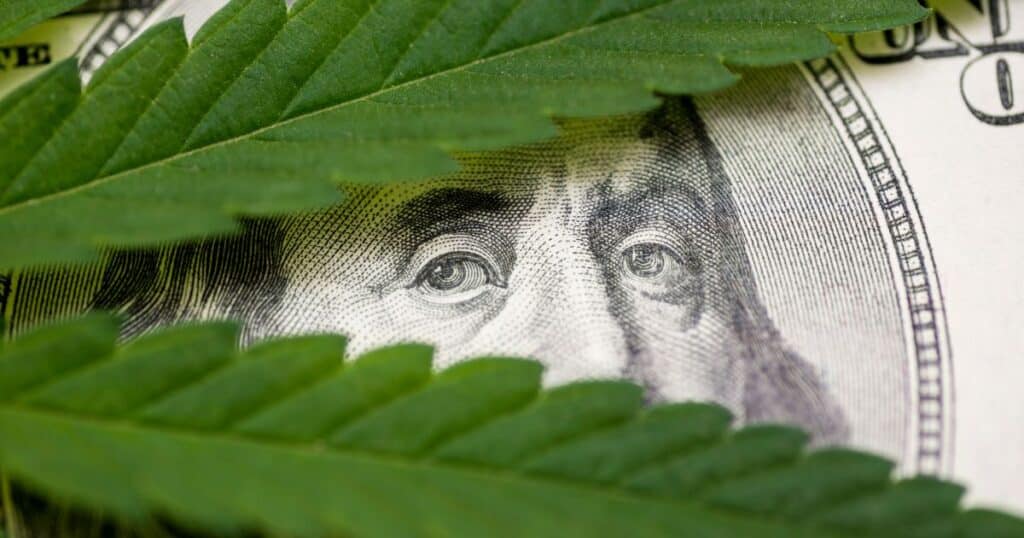Virginia faces decisions as it navigates the landscape of cannabis commercialization. Recent bills reaching bipartisan support in an attepmy to finally establish a regulated marketplace are helping the state inch closer to a state-wide shift in cannabis policy.
However, the final push towards legalization of retail marijuana sales hangs in the balance, sent upon the desk of Republican Governor Glenn Youngkin awaiting his signature or veto, he has publicly shown disinterest in cannabis legislation, emphasizing more pressing matters in the state.

Tangled Vine of Cannabis Legislation
Virginia started getting into cannabis reform in 2021 with SB 1406, leading the way in the South, being the first state to legalize adult cannabis use and cultivation.
However, the first laws hit some roadblocks, failing to set up a proper legally regulated cannabis marketplace.
The legislation that passed in 2021 faced delays as the new Republican Governor, Younkin, elected in 2022, has shown little interest in advancing cannabis legislation in the state.
The bill (SB 448) passed the House and the Senate late last month on March 28th with a vote of (51-Y 47-N) in the House and (21-Y 18-N) in the Senate.
The bill’s text is filled with details and regulations, aiming to balance social equity, public health, and tax revenues. If passed, some of the provisions in the proposal would include:
- Begin retail sales from May 1, 2025, pending the awaited approval or non action from the Gov.
- Allow adults to purchase up to 2.5 ounces of marijuana in a single transaction, with products taxed at a rate of 11.625%.
- Institute the Virginia Cannabis Control Authority, a pivotal agency tasked with the governance of the emerging industry.
- Embed strict guidelines for the retail environment, including proximity restrictions, packaging protocols, and labeling requisites.
- Establish criminal penalties for violations and breaches of the new framework, emphasizing public safety in the evolving cannabis climate.
The Governor’s Potential Strategies?
Governor Youngkin’s position on cannabis is unclear, expressed in rhetoric that fluctuates between nonchalance and subtle opposition. His deliberate silence on the marijuana sales bill that passed last week casts a puzzling shadow over its future.
“I’ve said before, this is an area that I really don’t have any interest in. What I want us to work on are areas where we can find a meeting of the mind and press forward to the betterment of Virginia, and there are so many of them,” he told reporters in January.
Observers speculate that his inaction may signal an intent to sidestep the debate altogether, allowing the bill to take effect automatically without his signature, as outlined by MarketWatch.
Such a conflicted approach could be seen as walking a political tightrope, enabling Youngkin to appease his conservative constituents who voted him in by not explicitly endorsing SB 448 while tacitly acknowledging the prevalent public support for cannabis commercialization.
Paving the Path for a Regulated Cannabis Marketplace
The tangible consequences of Virginia’s prospective cannabis marketplace are multifaceted, promising seismic shifts in social, economic, and legislative dimensions if passed.
A Boost to State Coffers
Tax revenues from cannabis sales have emerged as a tantalizing prospect for state coffers, especially as Virginia grapples with post-pandemic fiscal recovery.
The proposed tax structure includes a tax rate of 11.625 percent—8 percent for the state, an optional 2.5 percent tax for local governments, and the 1.125 percent portion of state sales tax that funds schools.
Social Equity
The bill is not solely a financial blueprint; it is also wielded as a tool for rectifying the past legacy of the war on drugs.
Strides are made to foster a landscape of equal opportunity, with micro-business programs and licensing preferences targeting individuals and communities marginalized by prior drug policies.
By instituting these affirmative provisions, the bill seems to be trying to cultivate an inclusive and equitable industry.
Countering the “Illicit” Market
The most compelling argument in favor of the legislation is the imperative to undercut the black market.
The absence of a regulated market has birthed a labyrinth of illicit channels, siphoning millions in revenue that the state was missing out on.
Advocates of the bill champion its ability to displace these enterprises with lawful dispensaries, assuring consumers access to legal, tested, and (perhaps most importantly to the state) taxable products.

With the passage of Virginia’s marijuana sales bill through both the House and Senate, the spotlight now squarely falls on Governor Youngkin, who finds himself at a critical juncture.
Despite cannabis being legal for personal use in the state for several years, Virginia remarkably still lacks a regulated market for legal purchases. This gap not only hobbles the state’s potential to reap substantial tax benefits but also leaves the door ajar for the “illicit” market to flourish.
Governor Youngkin’s apparent disinterest in the topic has stirred speculation about his next move. Will he exercise his veto power, sending a clear message of opposition and potentially stalling progress once again?
Or will he opt for a more passive approach, allowing the bill to become law by taking no action within the prescribed 30-day period?
This latter strategy might serve as a political salve, avoiding direct confrontation with the conservative base that elected him while subtly aligning with the majority of Virginians who favor the establishment of a legal, regulated cannabis market.
Most Popular News Posts
- With Deep Roots in Cali’s Cannabis Culture, Circle Labs of Marin County Delivers High Grade Hemp Derived CBD
- Nationwide Decline of THC Levels in Legal Weed Reveals a Tsunami of Boof on the Horizon
- How Meme Culture Has Helped Shape Cannabis Culture in California & Beyond
- The Great California Cannabis Tax Scam Revealed





